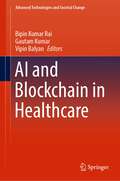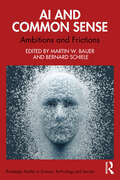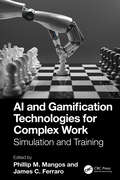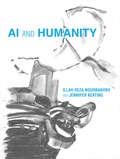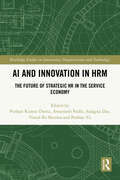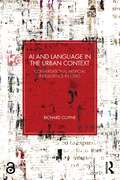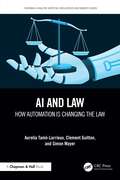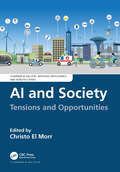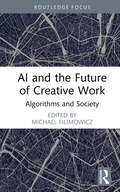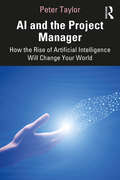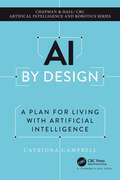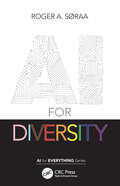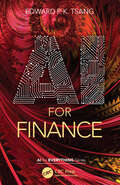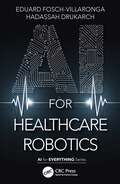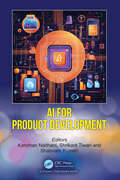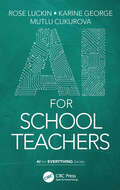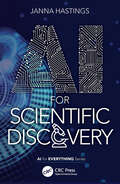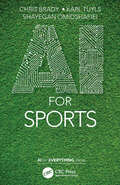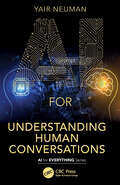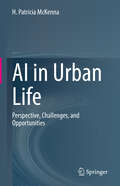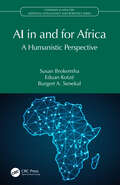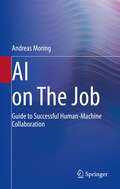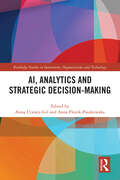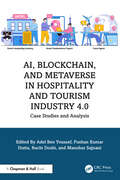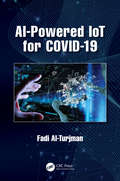- Table View
- List View
AI and Blockchain in Healthcare (Advanced Technologies and Societal Change)
by Gautam Kumar Bipin Kumar Rai Vipin BalyanThis book presents state-of-the-art blockchain and AI advances in health care. Healthcare service is increasingly creating the scope for blockchain and AI applications to enter the biomedical and healthcare world. Today, blockchain, AI, ML, and deep learning are affecting every domain. Through its cutting-edge applications, AI and ML are helping transform the healthcare industry for the better. Blockchain is a decentralization communication platform that has the potential to decentralize the way we store data and manage information. Blockchain technology has potential to reduce the role of middleman, one of the most important regulatory actors in our society. Transactions are simultaneously secure and trustworthy due to the use of cryptographic principles. In recent years, blockchain technology has become very trendy and has penetrated different domains, mostly due to the popularity of cryptocurrencies. One field where blockchain technology has tremendous potential is health care, due to the need for a more patient-centric approach in healthcare systems to connect disparate systems and to increase the accuracy of electronic healthcare records (EHRs).
AI and Common Sense: Ambitions and Frictions (Routledge Studies in Science, Technology and Society)
by Martin W. Bauer and Bernard SchieleCommon sense is the endless frontier in the development of artificial intelligence, but what exactly is common sense, can we replicate it in algorithmic form, and if we can – should we?Bauer, Schiele and their contributors from a range of disciplines analyse the nature of common sense, and the consequent challenges of incorporating into artificial intelligence models. They look at different ways we might understand common sense and which of these ways are simulated within computer algorithms. These include sensory integration, self-evident truths, rhetorical common places, and mutuality and intentionality of actors within a moral community. How far are these possible features within and of machines? Approaching from a range of perspectives including Sociology, Political Science, Media and Culture, Psychology and Computer Science, the contributors lay out key questions, practical challenges and "common sense" concerns underlying the incorporation of common sense within machine learning algorithms for simulating intelligence, socialising robots, self-driving vehicles, personnel selection, reading, automatic text analysis, and text production.A valuable resource for students and scholars of Science–Technology–Society Studies, Sociologists, Psychologists, Media and Culture Studies, human–computer interaction with an interest in the post-human, and programmers tackling the contextual questions of machine learning.
AI and Gamification Technologies for Complex Work
by James C. FerraroThe medium through which training in the workplace is delivered has been changing in recent years to offer a more personalized and immersive experience. The invention of virtual reality (VR) and augmented reality (AR) platforms has created opportunities to take a more hands-on approach to familiarizing oneself with a task or environment with mitigated time and monetary commitments. Written assessments are being swiftly replaced with more interactive and scientifically validated training simulations and this essential technology is in high demand in the government and private sectors. This book highlights many of the ways simulation-based training can be leveraged to create personalized training curricula for those in high-risk careers and how it can be assessed successfully. AI and Gamification Technologies for Complex Work uncovers the use of artificial intelligence (AI) and machine learning (ML) for the purposes of creating adaptive, personalized training for individuals who work in complex jobs. It covers adaptive simulation-based training, fighting skill decay through game-based training, and additional uses of AI/ML and other tools in measuring human performance. Insights from professionals and experts in the fields of simulation and training provide readers with information about current applications of AI/ML in creating adaptive or personalized training, as well as investigations into the future of simulation and game-based training, as virtual and augmented realities proliferate modern training programs. The book looks at how data science, AI, and ML contribute to adaptive training systems and the reader is encouraged to look further into the engines that drive adaptive training while devising their own systems for training in complex jobs. This book is ideal for professionals in human factors engineering and psychology, artificial intelligence, military training and simulation, game development, data science, modeling and simulation and industrial and organizational psychology.
AI and Humanity (The\mit Press Ser.)
by Illah Reza Nourbakhsh Jennifer KeatingAn examination of the implications for society of rapidly advancing artificial intelligence systems, combining a humanities perspective with technical analysis; includes exercises and discussion questions.AI and Humanity provides an analytical framing and a common language for understanding the effects of technological advances in artificial intelligence on society. Coauthored by a computer scientist and a scholar of literature and cultural studies, it is unique in combining a humanities perspective with technical analysis, using the tools of literary explication to examine the societal impact of AI systems. It explores the historical development of these technologies, moving from the apparently benign Roomba to the considerably more sinister semi-autonomous weapon system Harpy. The book is driven by an exploration of the cultural and etymological roots of a series of keywords relevant to both AI and society. Works examined range from Narrative of the Life of Frederick Douglass, given a close reading for its themes of literacy and agency, to Simon Head's critique of the effects of surveillance and automation on the Amazon labor force in Mindless.Originally developed as a textbook for an interdisciplinary humanities-science course at Carnegie Mellon, AI & Humanity offers discussion questions, exercises (including journal writing and concept mapping), and reading lists. A companion website provides updated resources and a portal to a video archive of interviews with AI scientists, sociologists, literary theorists, and others.
AI and Innovation in HRM: The Future of Strategic HR in the Service Economy (Routledge Studies in Innovation, Organizations and Technology)
by Pushan Kumar Dutta Amarnath Padhi Sulagna Das Vinod Kr Sharma Poshan YuThis book provides a comprehensive blueprint for organizations to strategically leverage AI technologies and drive innovation in their HRM practices, enabling them to cultivate a future-ready workforce that can thrive in the service-centric marketplace. It weighs in on the challenges and opportunities brought forth by the convergence of AI and HRM in a rapidly evolving service economy.Drawing insights from management theory, organizational psychology, and technology studies, this multidisciplinary book explores how AI can augment and elevate various facets of strategic HRM, from talent acquisition and employee development to performance management and organizational culture enhancement. It offers a future-focused perspective on HRM's evolving role in shaping the workplace of tomorrow, emphasizing the pivotal role of AI in fostering organizational agility, innovation, and competitiveness. The international contributors delve into the unique challenges and opportunities presented by AI integration in service industry contexts, providing tailored strategies and best practices for effective adoption, as well as addressing ethical considerations and responsible governance of AI systems.This timely volume will be a valuable resource for scholars across human resource management, organizational management, and innovation and technology management. It will be useful to HR professionals, business leaders, and decision-makers in service-based organizations.
AI and Language in the Urban Context: Conversational Artificial Intelligence in Cities
by Richard CoyneIn a world influenced increasingly by artificial intelligence (AI), the city emerges as a dynamic hub of digital conversations. AI and Language in the Urban Context offers a novel exploration of how AI, particularly large language models (LLMs), is transforming urban environments. Moving beyond the typical technological narratives, this book draws on the author’s unique expertise in design, semiotics and hermeneutics to present a critical cultural perspective on AI’s role in the city.Focusing on the intersection of urban theory and AI, the book reveals how conversational AI is reshaping social interactions, decision-making processes, and media in urban spaces. By merging practical knowledge of AI algorithms with an understanding of urban practices, the author highlights the opportunities and challenges AI presents for modern cities.This book is essential for anyone interested in the future of urban living. It provides a deep dive into the technical, social and cultural implications of AI in cities, offering practical examples and philosophical insights. Readers will gain a comprehensive understanding of how AI is influencing the design, governance and dynamics of urban life in the digital age.The Open Access version of this book, available at www.taylorfrancis.com, has been made available under a Creative Commons [Attribution-Non Commercial-No Derivatives (CC-BY-NC-ND) 4.0 license.
AI and Law: How Automation is Changing the Law (Chapman & Hall/CRC Artificial Intelligence and Robotics Series)
by Aurelia Tamo-Larrieux Clement Guitton Simon MayerThis book provides insights into how AI is changing legal practice, government processes, and individuals’ access to those processes, encouraging each of us to consider how technological advances are changing the legal system. Particularly, and distinct from current debates on how to regulate AI, this books focuses on how the progressive merger between computational methods and legal rules changes the very structure and application of the law itself.We investigate how automation is changing the legal analysis, legal rulemaking, legal rule extraction, and application of legal rules and how this impacts individuals, policymakers, civil servants, and society at large. We show through many examples that a debate on how automation is changing the law is needed, which must revolve around the democratic legitimacy of the automation of legal processes, and be informed by the technical feasibility and tradeoffs of specific endeavors.
AI and Society: Tensions and Opportunities (Chapman & Hall/CRC Artificial Intelligence and Robotics Series)
by Christo El MorrAI's impact on human societies is and will be drastic in so many ways. AI is being adopted and implemented around the world, and government and universities are investing in AI studies, research, and development. However, very little research exists about the impact of AI on our lives. This book will address this gap; it will gather reflections from around the world to assess the impact of AI on different aspects of society as well as propose ways in which we can address this impact and the research agendas needed.
AI and the Future of Creative Work: Algorithms and Society (Algorithms and Society)
by Michael FilimowiczThis book focuses on the intelligent technologies that are transforming creative practices and industries. The future of creative work will be more complicated than “the robots will take our jobs.” The workplace is becoming increasingly hybridized, with human and computational labor complementing each other. Some economic roles for the former will no doubt fade over time, while new roles are created to produce artificial intelligence (AI)-related technologies and implementations for productivity. New tools for the generation and personalization of content across platforms will be as ubiquitous as the automation of repetitive tasks in content creation workflows. Cultural conceptions of what it means to be a creative worker will necessarily change as a result of these transformations in human-machine labor. The volume covers the possibilities of humans and robots developing collegial relationships, creative cybernetics as machines and artists become co-creators of art, the reconcentration of corporate power as AI transforms the music industry, the rhetoric of algorithm-driven cultural production in streaming media, and how artisans provide a model of counter-hegemony to automation processes. Scholars and students from many backgrounds, as well as policy makers, journalists and the general reading public will find a multidisciplinary approach to questions posed by creative labor and industry research from communication, philosophy, robotics, media, music and the creative arts, informatics, information science, and computer science and engineering.
AI and the Project Manager: How the Rise of Artificial Intelligence Will Change Your World
by Peter TaylorEnabling project managers to adapt to the new technology of artificial intelligence, this first comprehensive book on the topic discusses how AI will reinvent the project world and allow project managers to focus on people. Studies show that by 2030, 80 percent of project management tasks, such as data collection, reporting, and predictive analysis, will be carried out by AI in a consistent and efficient manner. This book sets out to explore what this will mean for project managers around the world and equips them to embrace this technological advantage for greater project success. Filled with insights and examples from tech providers and project experts, this book is an invaluable resource for PMO leaders, change executives, project managers, programme managers, and portfolio managers. Anyone who is part of the global community of change and project leadership needs to accept and understand the fast- approaching AI technology, and this book shows how to use it to their advantage.
AI by Design: A Plan for Living with Artificial Intelligence (Chapman & Hall/CRC Artificial Intelligence and Robotics Series)
by Catriona CampbellThis book introduces the reader to Artificial Intelligence and its importance to our future. Campbell uses behavioural psychology, explores technology, economics, real-life and historical examples to predict five future scenarios with AI. Illustrating through speculative fiction, she describes possible futures after AI exceeds human capabilities. We are at a tipping point in history and must plan to ensure a successful co-existence with artificial intelligence. This book explains how to design for a future with AI so that, rather than herald our downfall, it helps us achieve a new renaissance.
AI for Diversity (AI for Everything)
by Roger A. SøraaArtificial intelligence (AI) is increasingly impacting many aspects of people’s lives across the globe, from relatively mundane technology to more advanced digital systems that can make their own decisions. While AI has great potential, it also holds great peril depending on how it is designed and used. AI for Diversity questions how AI technology can lead to inclusion or exclusion for diverse groups in society. The way data is selected, trained, used, and embedded into societies can have unfortunate consequences unless we critically investigate the dangers of systems left unchecked, and can lead to misogynistic, homophobic, racist, ageist, transphobic, or ableist outcomes. This book encourages the reader to take a step back to see how AI is impacting diverse groups of people and how diversity-awareness strategies can impact AI.
AI for Finance (AI for Everything)
by Edward P. TsangFinance students and practitioners may ask: can machines learn everything? Could AI help me? Computing students or practitioners may ask: which of my skills could contribute to finance? Where in finance should I pay attention? This book aims to answer these questions. No prior knowledge is expected in AI or finance. To finance students and practitioners, this book will explain the promise of AI, as well as its limitations. It will cover knowledge representation, modelling, simulation and machine learning, explaining the principles of how they work. To computing students and practitioners, this book will introduce the financial applications in which AI has made an impact. This includes algorithmic trading, forecasting, risk analysis portfolio optimization and other less well-known areas in finance. This book trades depth for readability. It aims to help readers to decide whether to invest more time into the subject. This book contains original research. For example, it explains the impact of ignoring computation in classical economics. It explains the relationship between computing and finance and points out potential misunderstandings between economists and computer scientists. The book also introduces Directional Change and explains how this can be used.
AI for Healthcare Robotics (AI for Everything)
by Eduard Fosch-Villaronga Hadassah DrukarchWhat is artificial intelligence (AI)? What is healthcare robotics? How can AI and healthcare robotics assist in contemporary medicine? Robotics and AI can offer society unimaginable benefits, such as enabling wheelchair users to walk again, performing surgery in a highly automated and minimally invasive way, and delivering care more efficiently. AI for Healthcare Robotics explains what healthcare robots are and how AI empowers them in achieving the goals of contemporary medicine.
AI for Product Development
by Shrikant Tiwari Kanchan Naithani Shabnam KumariAI for Product Development explores the transformative role of artificial intelligence in reshaping modern industries. This book offers a comprehensive guide, spanning the evolution of AI in product innovation to practical applications, such as clustering techniques, human-autonomous vehicle interactions, and personalized healthcare solutions. With contributions from leading researchers, it covers explainable AI, real-world case studies, and ethical considerations in intelligent systems. The chapters delve into cutting-edge topics such as YOLO model variants, AI-driven emotion detection, and strategies for overcoming AI implementation challenges. Designed for researchers, professionals, and students, it bridges theory and practice, emphasizing AI's profound impact on product development and beyond.
AI for School Teachers (AI for Everything)
by Rose Luckin Mutlu Cukurova Karine GeorgeWhat is artificial intelligence? Can I realistically use it in my school? What’s best done by human intelligence vs. artificial intelligence, and how do I bring these strengths together? What would it look like for me, and my school, to be AI Ready? AI for School Teachers will help teachers and headteachers understand enough about AI to build a strategy for how it can be used in their school. Examining the needs of schools to ensure they are ready to leverage the power of AI and drawing examples from early years to high school students, this book outlines the educational implications and benefits that AI brings to school education in practical ways. It develops an understanding of what AI is and isn't and how we define and measure what we value and provides a framework which supports a step-by-step approach to developing an AI mindset, focusing on ways to improve educational opportunities for students with evidence-informed interventions.
AI for Scientific Discovery (AI for Everything)
by Janna HastingsAI for Scientific Discovery provides an accessible introduction to the wide-ranging applications of artificial intelligence (AI) technologies in scientific research and discovery across the full breadth of scientific disciplines. AI technologies support discovery science in multiple ways. They support literature management and synthesis, allowing the wealth of what has already been discovered and reported on to be integrated and easily accessed. They play a central role in data analysis and interpretation in the context of what is called ‘data science’. AI is also helping to combat the reproducibility crisis in scientific research by underpinning the discovery process with AI-enabled standards and pipelines and supporting the management of large-scale data and knowledge resources so that they can be shared and integrated and serve as a background ‘knowledge ecosystem’ into which new discoveries can be embedded. However, there are limitations to what AI can achieve and its outputs can be biased and confounded and thus should not be blindly trusted. The latest generation of hybrid and ‘human-in-the-loop’ AI technologies have as their objective a balance between human inputs and insights and the power of number-crunching and statistical inference at a massive scale that AI technologies are best at.
AI for Sports (AI for Everything)
by Chris Brady Karl Tuyls Shayegan OmidshafieiIt seems that artificial intelligence (AI) is always just five years away, but it never arrives. Recently, however, developments have made the practical utility of game theory a genuine reality. Will sport provide the petri dish in which AI will prove itself? What do domain specialists like managers and coaches want to know that they can’t currently find out, and can AI provide the answer? What competitive advantages might AI provide for recruitment, performance and tactics, health and fitness, pedagogy, broadcasting, eSports, gambling and stadium design in the future? Written by leading experts in both sports management and AI, AI for Sports begins to answer these and many other questions on the future of AI for sports.
AI for Understanding Human Conversations (AI for Everything)
by Yair NeumanArtificial intelligence (AI) and specifically large language models (LLMs) revolutionize our lives with new technologies appearing at an unprecedented rate. These technologies can potentially change how we understand human conversations, from the dialogues of married couples to diplomatic conversations.This book explains how to use LLMs to analyze human conversations and how better LLMs can be developed by incorporating a deep theoretical understanding.Drawing on case studies from Pulp Fiction to diplomatic meetings, the book provides detailed, approachable, and theoretically grounded explanations of how LLMs can help us understand conversations.
AI in Urban Life: Perspective, Challenges, and Opportunities
by H. Patricia McKennaIn exploring artificial intelligence (AI) in urban life, this book brings together and extends thinking on how human-AI interactions are continuously evolving. Through such interactions, people are aided on the one hand, while becoming more aware of their own capabilities and potentials on the other hand, pertaining, for example, to creativity, human sensing, and collaboration. It is the particular focus of research questions developed in relation to awareness, smart cities, autonomy, privacy, transparency, theory, methods, practices, and collective intelligence, along with the wide range of perspectives and opportunities offered, that set this work apart from others. Conceptual frameworks are formulated for each of these areas to guide explorations and understandings in this work and going forward. A synthesis is provided in the final chapter for perspectives, challenges and opportunities, and conceptual frameworks for urban life in an era of AI, opening the way for evolving research and practice directions.
AI in and for Africa: A Humanistic Perspective (Chapman & Hall/CRC Artificial Intelligence and Robotics Series)
by Susan Brokensha Eduan Kotzé Burgert A. SenekalAI in and for Africa: A Humanistic Perspective explores the convoluted intersection of artificial intelligence (AI) with Africa’s unique socio-economic realities. This book is the first of its kind to provide a comprehensive overview of how AI is currently being deployed on the African continent. Given the existence of significant disparities in Africa related to gender, race, labour, and power, the book argues that the continent requires different AI solutions to its problems, ones that are not founded on technological determinism or exclusively on the adoption of Eurocentric or Western-centric worldviews. It embraces a decolonial approach to exploring and addressing issues such as AI’s diversity crisis, the absence of ethical policies around AI that are tailor-made for Africa, the ever-widening digital divide, and the ongoing practice of dismissing African knowledge systems in the contexts of AI research and education. Although the book suggests a number of humanistic strategies with the goal of ensuring that Africa does not appropriate AI in a manner that is skewed in favour of a privileged few, it does not support the notion that the continent should simply opt for a "one-size-fits-all" solution either. Rather, in light of Africa’s rich diversity, the book embraces the need for plurality within different regions’ AI ecosystems. The book advocates that Africa-inclusive AI policies incorporate a relational ethics of care which explicitly addresses how Africa’s unique landscape is entwined in an AI ecosystem. The book also works to provide actionable AI tenets that can be incorporated into policy documents that suit Africa’s needs. This book will be of great interest to researchers, students, and readers who wish to critically appraise the different facets of AI in the context of Africa, across many areas that run the gamut from education, gender studies, and linguistics to agriculture, data science, and economics. This book is of special appeal to scholars in disciplines including anthropology, computer science, philosophy, and sociology, to name a few.
AI on The Job: Guide to Successful Human-Machine Collaboration
by Andreas MoringThis book is a practical guide to using artificial intelligence with motivated employees in companies and organizations. You will learn what the prerequisites are for people to look forward to productive collaboration with "intelligent machines". Because this is the only way to leverage the full potential of AI. To this end, you will receive an overview of how and where AI can be used in companies and how to identify the right areas of application for AI in your company. The main issue here is the following: which tasks will be taken over by AI in the future and which should continue to be performed by employees. These decisions change processes and tasks and require practical change management and motivation. In this book, you will learn how to motivate and inspire people for these new tasks, so that the steps towards using AI in the work environment can succeed in the best possible way. About the Author: Prof. Dr. Andreas Moring is Professor of Digital Business, Innovation & AI at the International School of Management. He is founder and director of the JuS.TECH Institute for AI and Sustainability, co-founder of the WeGoFive initiative for productive human-AI cooperation and topic sponsor for human-AI cooperation at the Artificial Intelligence Center ARIC in Hamburg. This book is a translation of the original German 1st edition KI im Job by Andreas Moring, published by Springer-Verlag GmbH Germany, part of Springer Nature in 2021. The translation was done with the help of artificial intelligence (machine translation by the service DeepL.com). A subsequent human revision was done primarily in terms of content, so that the book will read stylistically differently from a conventional translation. Springer Nature works continuously to further the development of tools for the production of books and on the related technologies to support the authors.
AI, Analytics and Strategic Decision-Making (Routledge Studies in Innovation, Organizations and Technology)
by Ujwary-Gil, Edited by Anna Anna Florek-PaszkowskaAI, Analytics and Strategic Decision-Making is an insightful exploration into the transformative power of artificial intelligence and advanced analytics in business and policy contexts. This volume provides a unique blend of theoretical knowledge and practical applications, showcasing how AI and analytics are reshaping decision-making processes across multiple domains.From predicting high-growth firms using Random Forests to leveraging Large Language Models for process mining, this book offers an extensive look at the latest innovations in AI and their strategic implications. It explores diverse topics, including the role of knowledge management in Industry 4.0, AI-powered decision-making tools for individuals, and public policy-making through Internet Public Opinion Analysis. Each chapter provides a nuanced perspective on how AI and analytics tools—ranging from Social Network Analysis to agent-based modeling—can tackle real-world challenges, such as climate change, resource allocation, and productivity enhancement.AI, Analytics and Strategic Decision-Making will inspire entrepreneurs, policymakers, academics, and business strategists to think critically about the power of data-driven insights and AI technologies. This comprehensive resource dives into how innovative tools can foster informed decision-making, drive efficiency, and pave the way for strategic success in an increasingly complex world.
AI, Blockchain, and Metaverse in Hospitality and Tourism Industry 4.0: Case Studies and Analysis
by Pushan Kumar Dutta Adel Ben Youssef Ruchi Doshi Manohar SajnaniThe book offers a critical exploration of the integration of AI, blockchain, and metaverse technology in the hospitality and tourism industry to investigate the potential of these technologies in revolutionizing the industry. This comprehensive work studies, with practical examples, how cutting-edge technologies of Industry 4.0 are transforming luxury industry into a high-touch, hyper-personalized metaverse. It explains how these technologies can be used to improve customer experience and operational efficiency in areas such as guest interaction, supply chain management, payment processing, and virtual stores. The book also discusses the conditions that can promote sustainable development in the hospitality industry using Industry 4.0 technologies. Provides an innovative perspective by blending high-tech trends like AI, blockchain, and metaverse with traditional wellness practices Emphasis on ethical considerations and potential risks associated with the use of these technologies, providing a balanced perspective on their impact Includes case studies and practical examples on how businesses can use AI, blockchain, and the metaverse to improve customer experiences and operational efficiency Explores how the hospitality industry can embrace Industry 4.0 technologies to improve its operations, enhance customer experiences, and contribute to sustainable development Provides a roadmap for companies looking to implement these technologies, highlighting potential benefits and pitfalls of each approach This reference book is for scholars and professionals in computer science who are interested in studying the effect of AI, blockchain, and metaverse in hospitality and tourism industry.
AI-Powered IoT for COVID-19
by Fadi Al-TurjmanThe Internet of Things (IoT) has made revolutionary advances in the utility grid as we know it. Among these advances, intelligent medical services are gaining much interest. The use of Artificial Intelligence (AI) is increasing day after day in fighting one of the most significant viruses, COVID-19. The purpose of this book is to present the detailed recent exploration of AI and IoT in the COVID-19 pandemic and similar applications. The integrated AI and IoT paradigm is widely used in most medical applications, as well as in sectors that deal with transacting data every day. This book can be used by computer science undergraduate and postgraduate students; researchers and practitioners; and city administrators, policy makers, and government regulators. It presents a smart and up-to-date model for COVID-19 and similar applications. Novel architectural and medical use cases in the smart city project are the core aspects of this book. The wide variety of topics it presents offers readers multiple perspectives on a variety of disciplines. Prof. Dr. Fadi Al-Turjman received his PhD in computer science from Queen’s University, Kingston, Ontario, Canada, in 2011. He is a full professor and research center director at Near East University, Nicosia, Cyprus.
